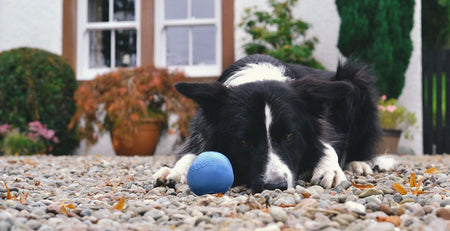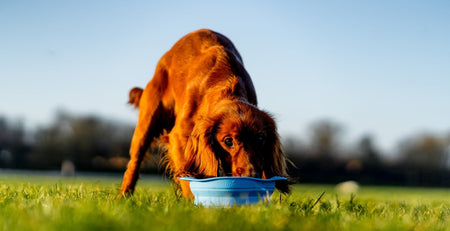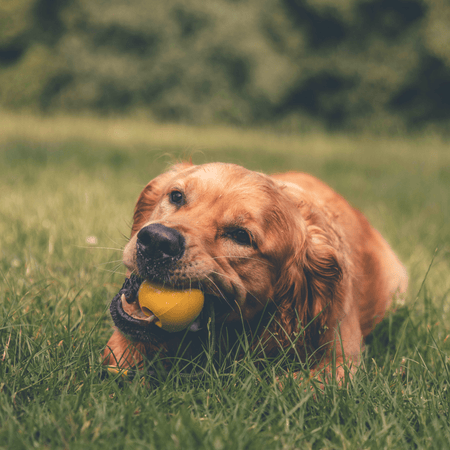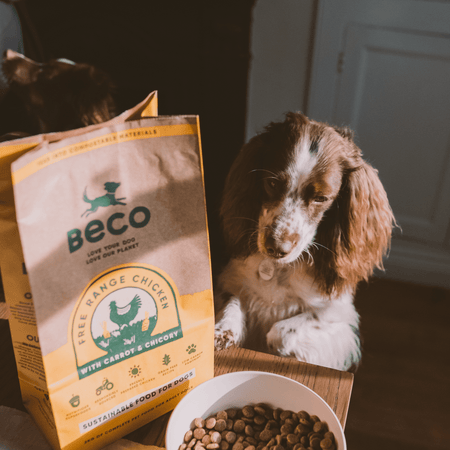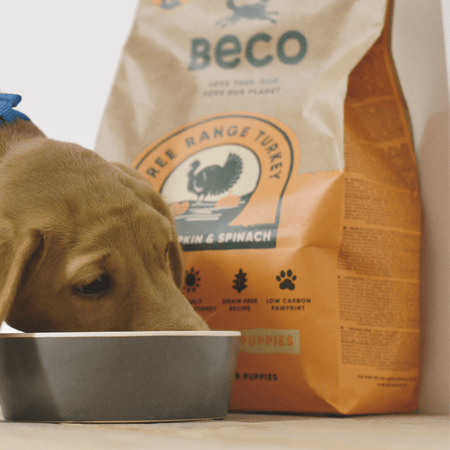Watching your beloved puppy refuse food can be a distressing experience, causing worry and uncertainty. Not only is it a worry for you and your new furry friend, but it can have complex causes, further adding to your concerns.
There are normally simple causes behind your puppy’s lack of appetite, including stress, a change in diet or a stomach upset. We’re here to guide you through all the possible reasons, as well as the solutions, putting you back on the right pathway to ensure your pup's well-being.
Key Summary
Puppies may refuse to eat due to environmental stress, illness, teething, food preferences, behavioural factors, physical activity levels or medication side effects.
Oral problems or discomfort from teething can significantly reduce food intake, as can food-related issues such as freshness, palatability or recent changes in diet.
Puppies can also refuse food as a behavioural response, such as pushing boundaries, experiencing separation anxiety or being overfed treats disrupting their regular meals.
Enhancing the appeal of dry or wet food, maintaining a regular feeding schedule, stress relief measures and appropriate training can all help manage a puppy's eating habits.
Prolonged refusal to eat, particularly if accompanied by symptoms like lethargy, vomiting, behavioural changes, or weight changes, should prompt immediate veterinary attention.
My Puppy isn’t Eating | 7 Causes
Understanding the root cause behind your puppy's refusal to eat is crucial in ensuring their overall health and wellbeing. From environmental changes to health issues, let's explore the key reasons that might lead to a loss of appetite in your young canine companion.
1. Stress and Environmental Changes
Puppies are incredibly sensitive to their environments. Sudden changes such as moving homes, the introduction of new family members or even changes in routine can lead to stress in puppies, causing them to go off food. The unfamiliarity of new surroundings can lead to uneasiness, resulting in a temporary loss of appetite.
Other environmental stressors could include loud noises, changes in temperature, or the presence of other animals. If your puppy is undergoing a significant transition, allow them some time to adapt while providing consistent care and comfort. Signs that suggest your pup is stressed include their tongue flicking out, tight facial muscles, a lowered tail and their ears held back.
2. Illness or Medical Conditions
A loss of appetite is often the first sign of illness in dogs. If your puppy isn’t eating, it could indicate a range of medical issues. Digestive problems like an upset stomach or gastrointestinal obstruction can cause puppies to refuse food.
More severe medical conditions, such as parasitic infections, liver or kidney diseases, pancreatitis, or other systemic diseases, may also lead to your puppy not eating much. If the lack of appetite is coupled with symptoms like lethargy, vomiting, diarrhoea, changes in weight or changes in behaviour, it's crucial to seek immediate veterinary attention.
3. Teething or Oral Problems
Puppies start teething around three to six months of age, and during this time, you might notice your puppy's loss of appetite. The process of teething can be uncomfortable, causing sore and inflamed gums, which can deter puppies from eating. Other oral health issues such as dental diseases, mouth injuries, gum infections or growths can cause pain and discomfort while eating, leading to a significant decrease in food intake.
4. Food-Related Problems
Puppies can be particular about their food, and a variety of food-related factors can contribute to your puppy not eating enough. Your puppy might not find the food palatable due to its taste, texture or smell.
The freshness of food also matters — food that's stale, expired, or improperly stored can lose its appeal, or worse, be harmful. Another factor could be if you've recently changed your puppy's diet, be it the brand or the type of food (dry or wet), they might resist the new food initially due to unfamiliarity.
Gradual transition between diets can help in such scenarios. Also, some puppies may have food allergies or sensitivities that could affect their willingness to eat.
5. Behavioural Factors
Like children, puppies can sometimes be stubborn, curious or anxious, all of which can impact their eating habits. Puppies may refuse food to assert independence or push boundaries, and inconsistent feeding routines can contribute to such behaviour.
Anxiety can also lead to appetite loss with separation anxiety being a common issue in puppies. Furthermore, overfeeding treats or table scraps can disrupt their diet, making your puppy not interested in food during meal times. It's important to stick to a balanced diet and a consistent feeding schedule to instil good eating habits.
6. Physical Activity and Fatigue
Puppies are bundles of energy and require a good deal of physical activity, however, overexertion can lead to fatigue, which might result in your puppy not eating all his food. Similarly, a lack of sufficient physical activity can also affect a puppy's appetite. The energy balance is crucial for maintaining a healthy appetite in puppies.
7. Vaccination or Medication Side Effects
If your puppy recently received vaccinations or is on medication, the side effects might include a temporary loss of appetite. Although this is usually no cause for alarm, if your puppy won't eat for extended periods post medication or vaccination, it would be wise to consult your veterinarian.

How to Fix Why Your Puppy Won’t Eat
We’ve looked at the possible causes but now let's look at what to do if your puppy isn’t eating. Here are some possible solutions:
Puppy Not Eating Dry Food
If your puppy won't eat dry food, consider enhancing its appeal by introducing some variety. Mixing a bit of wet food or broth into the dry kibble can make it more enticing. The added moisture not only enhances the aroma, tempting your puppy's sense of smell, but also makes the kibble easier to chew. Warming the dry food slightly can also help release its aroma, attracting your puppy towards the food bowl.
Puppy Not Eating Wet Food
Some puppies might prefer crunchier textures, in which case wet food alone might not be very appealing. If your puppy won't eat wet food, mixing it with a bit of dry kibble could do the trick. The contrast in textures might make the meal more exciting and enticing for your puppy. Be sure to use high-quality dry food to ensure your puppy is getting all the nutrients it needs.
Teething Puppy
Teething can be a painful phase for puppies, causing them to refuse food. During this time, providing your puppy with soft, chewable toys can help alleviate the discomfort. Freezing wet food or broth into cubes and letting your puppy gnaw on them can also offer some relief while providing nourishment. Soaked kibble or puppy-friendly foods that are soft and easy to eat can also be beneficial.
Stress Relief

If your puppy is stressed, particularly due to a change in environment or routine, it's important to keep their surroundings as stable as possible. Regular exercise, playtime and plenty of rest can help reduce stress levels, restoring your puppy's appetite.
𝐢 Keep the feeding area quiet and comfortable, away from high traffic areas to minimise disturbances. Gentle reassurance and positive interactions can also help your puppy adjust to the new changes more smoothly.
Puppy Training
Training plays a key role in forming good eating habits in puppies, and in fact, in the UK on average a dog owner will spend £594 on dog training services, highlighting its popularity and importance.
Using positive reinforcements at mealtimes and teaching your puppy to associate food with good things are both useful techniques. Try rewarding good behaviour around food with praise, petting, and playtime and never punish or force your puppy to eat as this can create negative associations with food.
Importance of Routine
If your puppy has gone off food, trying different brands, flavours, or types of food (while ensuring nutritional balance) can sometimes help stimulate their appetite. Be sure to transition slowly from one type of food to another to avoid upsetting your puppy's stomach.
| Breed Size | Puppy's Age (Months) | Meals per day |
|---|---|---|
| Small | 2-4 | 4 |
| 4-6 | 3 | |
| 6+ | 3 | |
| Medium | 2-4 | 4 |
| 4-6 | 3 | |
| 6+ | 2 | |
| Large | 2-4 | 4 |
| 4-6 | 3 | |
| 6+ | 2 |
Trying Different Foods
Puppies thrive on consistency and predictability. Maintaining a regular feeding schedule is essential to manage their dietary needs effectively as it will regulate your puppy's digestive system but also instil a sense of security.
An example of a puppy feeding schedule could be:
Should I Be Concerned if My Puppy Doesn’t Want to Eat?
Puppies, with their curious nature and developing taste buds, can indeed be fussy eaters. Occasional bouts of decreased appetite or selective eating can be a normal part of their growing process, but when your puppy isn’t eating much, understanding when it's a cause for concern can be crucial for their health.
A temporary loss of appetite might be due to reasons such as a new environment, changes in diet, or minor upset stomach, often resolving within a day or two. Your puppy might also exhibit pickiness with food or prefer playing over eating. These instances, while requiring monitoring, are usually not immediate causes for alarm.
If your puppy isn’t eating for more than 24 hours and you don’t know why, it's important to seek veterinary attention. Prolonged refusal to eat can lead to nutritional deficiencies and may indicate underlying health issues. A puppy that has gone off food completely, especially if it's a young or small breed, can quickly suffer from hypoglycemia (low blood sugar), which can be dangerous.
It is also time to be concerned if your puppy is lacking appetite and displays the following symptoms:
Lethargy
If your puppy isn’t just refusing food but is also less active, sleeps more than usual, or appears weak, it might be a sign of an illness.
Vomiting or Diarrhoea
These are common symptoms of gastrointestinal issues in dogs. If your puppy is not eating and also shows signs of gastrointestinal distress, consult your vet immediately.
Changes in Behaviour
Behavioural changes, such as increased aggression or fear, excessive licking or significant changes in their toilet habits, can be signs of distress or illness.
Changes in Weight
Rapid weight loss or gain can be indicative of various health issues. If your puppy isn’t eating and is losing weight, it's crucial to consult a vet.
Dehydration
If your puppy isn’t drinking enough water, it can lead to dehydration, which can further suppress their appetite.
Frequently Asked Questions (FAQs)
Why Has My Puppy Gone Off Food Suddenly?
A sudden change in your puppy's eating habits can be disconcerting but if it is a sudden change in appetite it is likely to be as a result of environmental changes and stress, teething or possibly a stomach upset.
If your puppy refuses to eat for more than a day or shows other signs of illness, like lethargy, vomiting or changes in stool, it's advisable to consult a vet promptly.
Why is My Puppy Not Eating But Acting Normal?
It might be perplexing when your puppy is not eating but acting normal otherwise. Various factors could contribute to this scenario. Your puppy could be teething, causing discomfort while eating, or they might not like their food, especially if you've recently changed their diet.
They could also be full from overfeeding on treats or table scraps, leading to a decreased appetite during meal times, however, even if your puppy seems otherwise healthy, consistent refusal to eat should not be overlooked.
Loss of appetite can be a sign of underlying issues that might not be immediately apparent, therefore, it's advisable to monitor their eating habits and keep an eye on other symptoms. If your puppy continues to refuse food for more than 24 hours, it would be prudent to consult a vet.
Conclusion
Understanding why your puppy is not eating involves observing their behaviour, monitoring changes, and recognising symptoms of potential illness. The reasons can vary from behavioural factors to serious medical conditions.
Maintaining a consistent routine, providing a stress-free environment, offering a balanced diet, and consulting a vet when necessary can help ensure your puppy's health and wellbeing.

